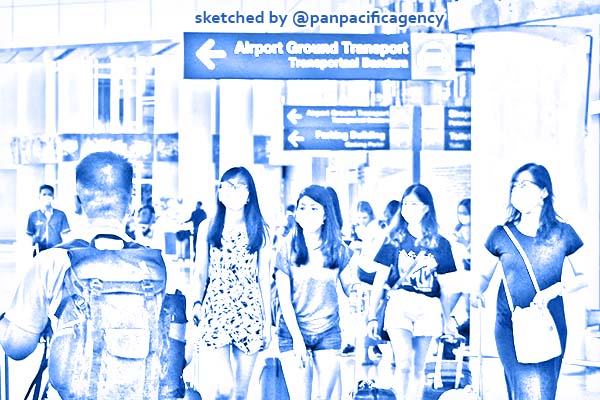Tourism players laud new health protocols as destinations reopen in Indonesia

Passengers wear masks in the arrival hall of Bali's Denpasar airport. CREDIT: AMILIA ROSA. Sketched by the Pan Pacific Agency.
JAKARTA, JUn 25, 2020, The Jakata Post. Tourist industry experts have lauded the government’s decision to issue health protocols for public places such as hotels and restaurants, saying the measures will provide customers peace of mind as tourist destinations start to reopen, The Jakata Post reported.
Health Minister Terawan Agus Putranto signed on June 19 a decree on health guidelines for public facilities, including hotels, restaurants, shopping malls, fitness centers, convention halls, tourist destinations and public transportation.
In general, such establishments are obliged to provide hand sanitizers in public spaces, clean these areas with disinfectant at least three times a day and maintain proper ventilation by prioritizing fresh air circulation or periodically replacing air conditioner filters.
Temperature checks and the use of face masks are also mandatory for both employees and guests, according to the decree. People without masks are barred from entering public facilities and spaces.
The 50 percent cap on venue capacity that has been widely used by businesses is not included in the decree, which instead has a 1-meter social distancing rule.
The decree also provides specific regulations for certain businesses, such as mandatory room disinfection prior to guest check-in and the provision of hand sanitizers in each room for hotels.
Convention hall operators are obliged to enforce the 1-meter physical distancing rule by limiting the number of attendees. In addition, venues and restaurants have been instructed to suspend buffet services and to provide takeaway menus.
Customers at beauty parlors and hairdressers are urged to bring their own makeup tools, while employees are required to sanitize equipment that is used on multiple customers, such as hair clippers and towels.
“We believe that the protocol is sufficient enough to provide assurances to our consumers that we can limit the spread of COVID-19,” Indonesian Hotel and Restaurant Association (PHRI) chairman Hariyadi Sukamdani told The Jakarta Post in a phone interview on Monday.
He lauded the government’s initiative to issue the health protocols, saying they could help spur confidence in consumers.
The tourist industry is among the worst-hit sectors amid the COVID-19 pandemic as people have chosen to stay at home to avoid catching the highly contagious coronavirus while governments around the world have closed their borders.
Foreign tourist arrivals dropped 87.44 percent year-on-year to 160,000 in April, the lowest in recent history, as countries around the world have imposed different degrees of lockdowns or physical distancing measures, Statistics Indonesia (BPS) data show.
However, Hariyadi said the new health protocols had become a financial burden for hoteliers and tour operators whose cash had been depleting following months of closures.
“We need additional capital to cover the costs of introducing the health protocols. It has become a challenge for us as financial institutions are still reluctant [to provide loans],” he said.
He also urged the government to more aggressively trace COVID-19 cases to push down the infection rate, which shows no sign of flattening in Indonesia.
Indonesia recorded over 47,800 positive COVID-19 cases as of Tuesday afternoon, a daily increase of more than 1,000 cases, as the death toll reached at least 2,500, official data show. It is also the country with the highest number of cases in Southeast Asia.
Tourist industry expert Henky Hermantoro said the protocols could help improve market confidence in the industry despite the rising number of COVID-19 cases in the country.
“While the COVID-19 infection number continues to grow, I think we cannot shut down the industry for too long. The tourist industry provides a huge multiplier effect to the economy and we need to reignite it,” Henky told the Post in a separate interview.
Henky said tourist industry players should attract local customers to kick-start their businesses as people were reluctant to travel long distance.
The issuance of the decree was followed by a decision from the national COVID-19 task force to gradually reopen the country’s tourist destinations, ending months of operational shutdown.
COVID-19 task force chief Doni Monardo said Monday the government would reopen natural tourist destinations, including national parks and water and wildlife conservation sites that were located in regions with a low infection rate.
“Regents and mayors [who reopen tourist destinations] must always consult with governors and implement health protocols issued by the central government,” Doni said in a broadcasted press conference.
Destinations must also limit the number of visitors to 50 percent of their normal capacity and consistently monitor for potential outbreaks, Doni added.
Tourism and Creative Economy Minister Wishnutama Kusubandio welcomed the health minister’s decree, saying he hoped it would standardize health requirements for industry players, as current protocols were formed independently or based on guidelines issued by various industry associations.